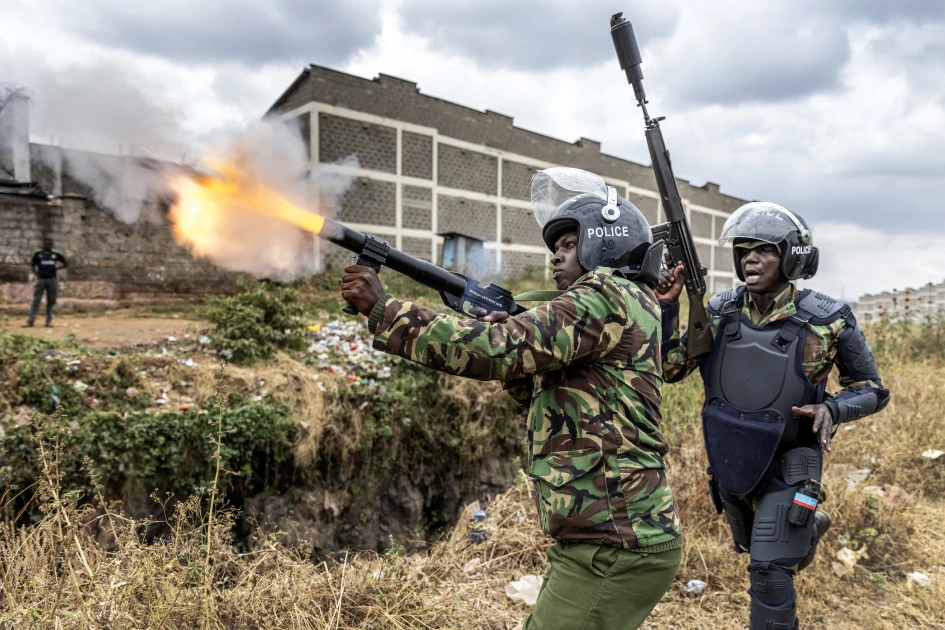OPINION: Why Kenya should not send its police force to Haiti

A Kenya Police Officer shoots a tear gas canister to disperse some protesters as they gather to demonstrate in Nairobi, Kenya on July 12, 2023. (Photo by Luis Tato / AFP)

Audio By Vocalize
The UN also estimates that 2,500 people have been murdered by criminal gangs in 2023. In addition to this, 80% of the Haitian capital Port-au-Prince is controlled by gangs.
Several of the leading gang members in Haiti, including the notorious Jimmy “Barbeque” Cherizier, have vowed to fight against any foreign intervention in their country.
This cacophony of bad signs epitomizes why Kenya should not send its police force to Haiti.
As much as any observer would want to see the glass half full rather than half empty, on the balance of pros and cons, this proposal to send Kenyan police to Haiti appears doomed from the onset.
For one, the three major regional giants in North and South America, Canada, US and Brazil have not intervened in Haiti.
This begs the question, why Kenya, a developing country, would want to intervene on an island republic 12,000 kilometres away when Kenyans are dying in ethnic clashes in Sondu that the Kenyan police cannot stop?
Courtesy begins at home. Shouldn’t the constitutional priority of protecting life begin in Kenya rather than in a hellhole 12,000 kilometres away?
There is a reason Brazil, the US and Canada as regional behemoths have not intervened in Haiti. It is not in their national interests.
The Ruto Administration will be hard-pressed to identify the national interest of Kenya in Haiti. There is none!
On an operational basis, there is no way the Kenyan police will get fluent in French in a few months to communicate with the Haitian population.
What complicates the scenario even more is most Haitians speak Creole and not French.
So the Kenyan police will not only find themselves in a foreign environment they do not know but will be unable to communicate with the local population to gather intelligence, enforce the law and capture vigilantes and gang members that are perpetrators of the numerous kidnappings, murders and rapes of women and children in that country.
The rules of engagement for this Kenyan-led United Nations multinational force have also not been defined.
Will the Kenyan police for example be allowed to use lethal force to protect themselves in the event of an imminent threat to their lives?
Who will have authority over any human rights violations on Haitian civilians by the Kenyan police? Will these officers be tried in Haiti, Kenya, or the International Court of Justice?
The last reason why Kenya should not send its police force to Haiti is the inevitable entanglement of Kenyan forces in the internal wars of different factions contesting for power in Haiti.
The unelected Prime Minister Ariel Henry has asked the United Nations for an intervention force. However, not only is he very unpopular in Haiti since taking over from the assassinated president Jovenel Moise, but he is by default, one of the belligerents in the clash of vigilantes in Haiti.
The Kenyan police will find themselves entangled in a local dispute between Prime Minister Ariel Henry on one hand and the plethora of vigilante gangs on the other.
The deployment of Kenyan troops to Haiti is a disaster waiting to happen. The UN estimates there are close to 270,000 illicit arms circulating in Haiti.
These weapons are shipped into Haiti through Florida in the US. Kenyan police will find themselves outgunned, being kidnapped for ransom, killed, and maimed 12,000 kilometres away from home.
In addition to this, extracting this police force when things go bad looks like a logistical nightmare.
This is because the Kenya Navy has no capacity to deploy as far away as the Caribbean Sea. Relying on the benevolence of the US is not a good idea.
All said, historically, no intervention in Haiti has gone well. The French, Americans and UN have tried in the past and failed. It is doubtful that an understaffed, outgunned Kenyan police force in Haiti will fare any better.
This is why Kenya should not send its police force to Haiti.
Professor Monda teaches political science, international relations, and foreign policy at the City University of New York. @dmonda1, davidmonda.com


Leave a Comment